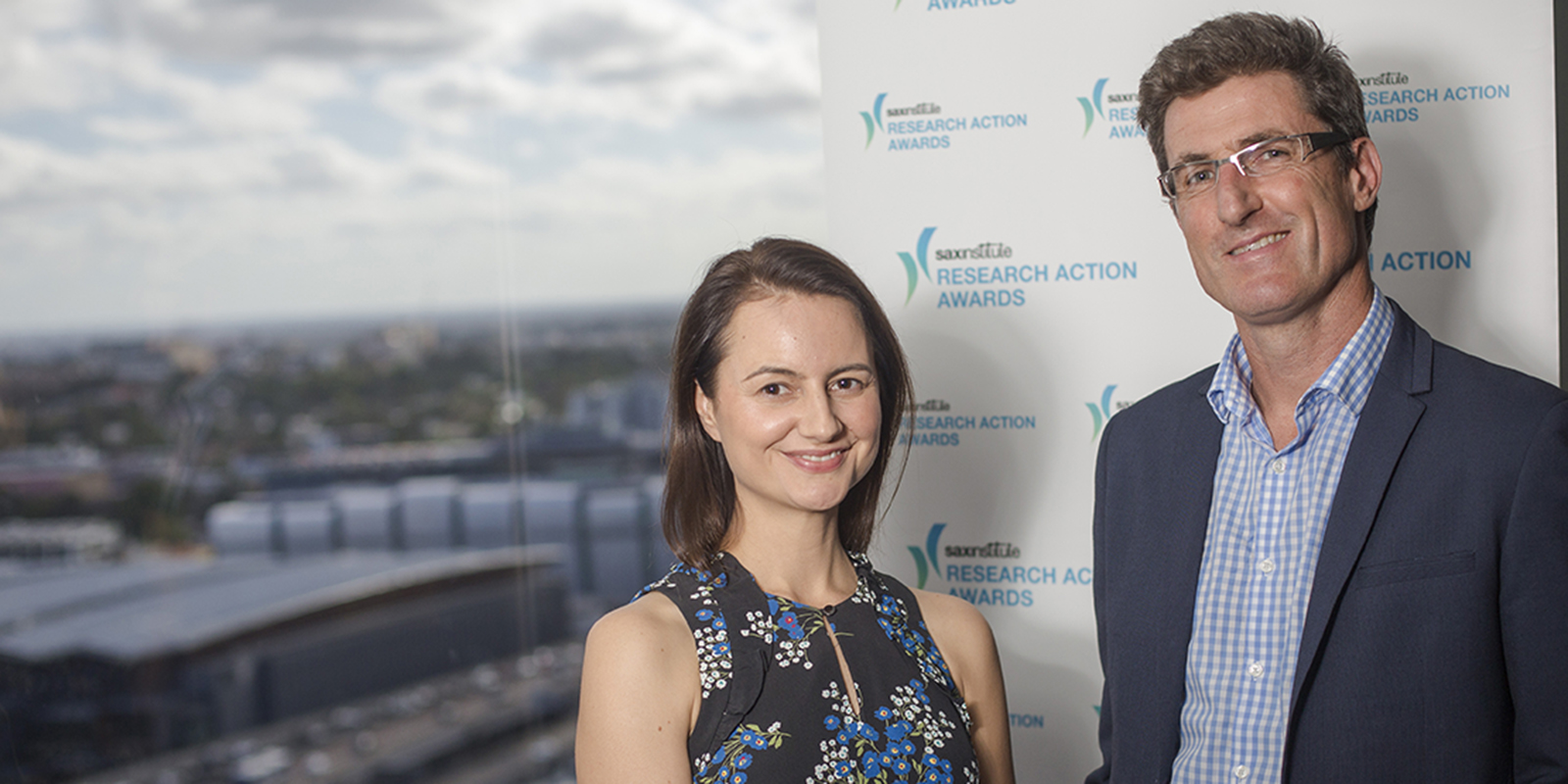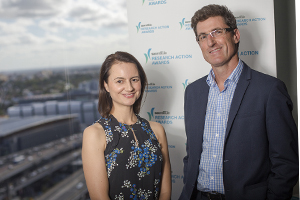

Two researchers whose work is having an impact on the ground in the diverse areas of alcohol-related violence and in supporting driver licensing systems to improve Aboriginal health and wellbeing have been recognised at the Sax Institute’s 2017 Research Action Awards.
The 2017 award winners were named as Professor Kypros Kypri, whose research showing that reducing hotel trading hours could reduce alcohol-related violence has informed alcohol policies, and Patricia Cullen, whose research has supported the rollout of a program supporting Aboriginal and Torres Strait Islander people across NSW to gain their driver licences.
The awards were established by the Sax Institute in 2015 to recognise researchers whose work has made a difference to health policy, practice and service delivery, and the winners were selected by a panel of international and national experts.
“These awards recognise researchers whose work has made a real-world difference to people’s health and wellbeing,” said Sax Institute CEO Professor Sally Redman. “The work of this year’s winners, along with that of the impressive pool of talented researchers who entered the awards, will benefit the entire community,”
Professor Redman said she hoped the awards would also inspire early career researchers to undertake research that has an impact.
How to undertake research with impact
During a panel discussion led by author and broadcaster James O’Loghlin at the Sydney award ceremony, health leaders discussed the challenges of using research in policy, and offered advice to early career researchers about how to undertake research that has an impact on policy and practice.
The panel comprised Dr Teresa Anderson, Chief Executive, Sydney Local Health District; Dr Kerry Chant, Chief Health Officer and Deputy Secretary, Population and Public Health, NSW Health and Ms Erica Kneipp, Assistant Secretary, Health and Medical Research, Australian Government Department of Health.
They urged researchers to discuss their ideas with decision makers before embarking on research, to ensure the research was purposeful, that it engaged the end-user, and was designed in a way that could be readily implemented or scaled up within the existing health system.
The winning researchers
Professor Kypros Kypri, University of Newcastle − Building evidence to underpin new policies on alcohol-related violence
Professor Kypri, a behavioural scientist and Professor in the School of Medicine and Public Health at the University of Newcastle, examined the impact of the Newcastle ‘last-drinks’ restrictions on assaults in the CBD. The restrictions limited the opening hours of some licensed premises. He found that these restrictions resulted in a large reduction in assaults compared to a similar locality where pubs remained open.
The findings of the Newcastle study helped support the continuation of restrictions despite intense and persistent pressure from the alcohol industry. The findings were also important in the design and efforts to implement law changes in Sydney (2014) and Queensland (2016).
Professor Kypri said a “confluence of factors” played into the policy changes in each jurisdiction, but the research findings helped give policy makers the evidence that changes were effective.
“Research alone very rarely drives policy change, but it can facilitate reform,” he said. “In this situation, it gave the politicians something to show that the changes they were introducing were likely to be effective.”
Ms Patricia Cullen, Research Fellow, George Institute for Global Health − Driving change in licensing systems and in Aboriginal and Torres Strait Islander health and wellbeing
Low rates of licensed drivers in many Aboriginal communities are a “missing piece of the puzzle” in health and wellbeing, according to Research Fellow Patricia Cullen.
A driver licence is critical not just for safe driving but for accessing healthcare, education and employment and for reducing the risk of incarceration, she said.
“Having a driver licence can do much to improve health and reduce road injury.”
Ms Cullen, a PhD candidate, evaluated a community-led program called Driving Change*, which aims to help Aboriginal people to overcome barriers to gaining a driver licence. The program involves the employment of local Aboriginal and Torres Strait Islander youth workers to help people in their community with all aspects of the driver licensing system.
Her research enabled the program to be adapted to meet community needs and her findings showed Driving Change was a culturally-safe facilitator of licensing, strengthened by community ownership.
The findings led to the uptake of the Driving Change program model by the NSW Government, which directly funded 14 communities across NSW to deliver licensing support in 2016−17, with further communities set to become involved this year.
“Getting a driver licence has an amazing impact on people’s independence and empowers communities” Ms Cullen said. “It opens so many doors for people and their families − many of those involved have told us that it has changed their lives.”
* The Driving Change program was developed by The George Institute for Global Health with the support of founding partner, the AstraZeneca Young Health Programme, and principal partners Transport for NSW, and NSW Health, with immense contribution from the Driving Change Youth Workers, Steering Committee, Investigative Committee and the Driving Change communities
Find out more
- Read about the panel discussion: How to ensure your research has impact: tips from health leaders
- Read about the 2016 award winners
